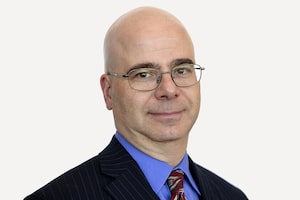
Former FTX CEO chief executive Samuel Bankman-Fried in Washington on Nov. 13. A restructuring expert who has taken over as chief executive officer of cryptocurrency exchange says he has never in his 40-year career seen 'such a complete failure of corporate controls.'STEFANI REYNOLDS/AFP/Getty Images
John Ray, the restructuring expert who has taken over as chief executive officer of beleaguered cryptocurrency exchange FTX Ltd., says he has never in his 40-year career seen “such a complete failure of corporate controls and such a complete absence of trustworthy financial information.”
Mr. Ray has cleaned up multiple failures in his time, from Enron Corp. to Nortel Networks Corp. But, he asserted Thursday in an FTX filing in U.S. bankruptcy court, “From compromised systems integrity and faulty regulatory oversight abroad, to the concentration of control in the hands of a very small group of inexperienced, unsophisticated and potentially compromised individuals, this situation is unprecedented.”
Mr. Ray’s findings came just days after he became head of FTX on Nov. 11. However, any signs the crypto company was deficient in financial controls and disclosure appear to have eluded major investors for years. That includes the Ontario Teachers’ Pension Plan, which put US$95-million into Bahamas-based FTX over two rounds of investment, in October, 2021, and this past January, through its Teachers’ Venture Growth arm.
In a statement to The Globe and Mail late Thursday, Teachers spokesperson Dan Madge said the fund will write down its investment in FTX to zero by year-end. Teachers conducts “robust due diligence on all private investments,” he said, describing the general process.
“Supported by experienced, external consultants with financial, commercial, and other relevant expertise, and often in consultation with investment partners, due diligence is designed to use company-provided materials and other research to assess the risk related to a specific investment,” he said.
“In FTX’s case, our underwriting process included working closely with third-party advisors and FTX to explore commercial, regulatory, tax, financial, technical and other matters,” Mr. Madge said. “Recent reports suggest potential fraud conducted at FTX which is deeply concerning for all parties. We fully support the efforts of regulators and others to review the risks and causes of failure for this business.”
Teachers did not provide details about the exact timing of its due diligence on FTX, nor any details about its particular findings from the process.
“We are disappointed with the outcome of this investment, take all losses seriously and will use this experience to further strengthen our approach,” Mr. Madge said.
Temasek Holdings Ltd., Singapore’s state investment fund, issued a lengthy statement on Thursday that recognized the “learnings” it will take away from the “inherent risks” of its US$275-million investment in FTX, all of which it is now writing off.
Temasek said it conducted a nearly eight-month-long due diligence process on FTX that ended in October, 2021, for which it reviewed audited financial statements and sought advice from legal and cybersecurity specialists in an unspecified number of jurisdictions. It also gathered “qualitative feedback” on FTX by interviewing people “familiar with the company, including employees, industry participants and other investors.”
Temasek found that FTX was profitable, it said. “We recognise that while our due diligence processes may mitigate certain risks, it is not practicable to eliminate all risks.”
“It is apparent from this investment that perhaps our belief in the actions, judgment and leadership of Sam Bankman-Fried, formed from our interactions with him and views expressed in our discussions with others, would appear to have been misplaced.”
Mr. Ray says he has brought in multiple law firms and other professionals to help him administer the affairs of FTX, which he placed into bankruptcy. Part of his job is responding to regulators who are investigating Mr. Bankman-Fried, the FTX founder and former CEO.
In the bankruptcy filing, Mr. Ray describes FTX as a set of interrelated companies with no central cash-management system, missing financial statements for a number of its businesses and an expense-payment system in which executives approved expenses via chatroom emojis.
Mr. Bankman-Fried, the child of two Stanford Law School professors, “often communicated by using applications that were set to auto-delete after a short period of time, and encouraged employees to do the same,” Mr. Ray said. That resulted in an absence of decision-making records, “one of the most pervasive failures of the FTX.com business.”
Now, under Mr. Ray’s leadership, the FTX companies “are writing things down,” he said.
Mr. Ray said companies in two of FTX’s business lines received audit opinions from Armanino LLP, a 70-year-old California firm that he’s familiar with.
The auditing firm for the exchanges doing business as FTX.com was Prager Metis, “a firm with which I am not familiar,” Mr. Ray said, “and whose website indicates that they are the ‘first-ever CPA firm to officially open its Metaverse headquarters in the metaverse platform Decentraland.’”
New York City-based Prager Metis says it traces its roots back 100 years and has more than 100 partners and 24 offices. Neither Prager Metis nor Armanino responded to e-mails from The Globe requesting comment.
“I have substantial concerns as to the information presented in these audited financial statements,” Mr. Ray said, referring to Prager Metis. He said neither FTX stakeholders nor the bankruptcy court should rely on the financials “as a reliable indication of the financial circumstances” of those parts of FTX’s business.
Mr. Ray said under his leadership at FTX so far, he has not been able to locate any audited financial statements for Alameda Research LLC, an affiliated trading firm and hedge fund run by Mr. Bankman-Fried, or a number of venture-investment companies affiliated with FTX.
FTX was funnelling customer assets worth nearly US$10-billion to Alameda, The Wall Street Journal and crypto publication CoinDesk first reported last week.
Mr. Ray said in the filing that FTX Group’s “unacceptable management practices” included “the use of software to conceal the misuse of customer funds” as well as a secret exemption of the Alameda hedge fund from certain FTX.com protocols.
Mr. Ray also said FTX “did not have the type of disbursement controls that I believe are appropriate for a business enterprise,” describing how employees submitted payment requests through an online chat platform, on which supervisors “approved disbursements by responding with personalized emojis.”
Mr. Ray also said he understands that FTX corporate funds were used to purchase homes in the Bahamas and other personal items for employees and advisers. For some transactions, “there does not appear to be documentation that they were loans.”
 Temur Durrani
Temur Durrani David Milstead
David Milstead